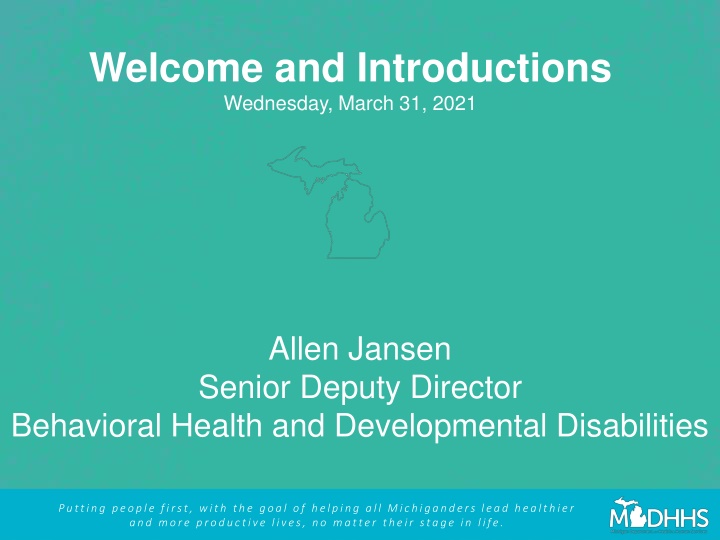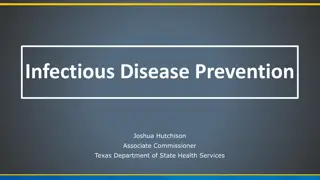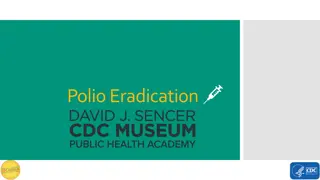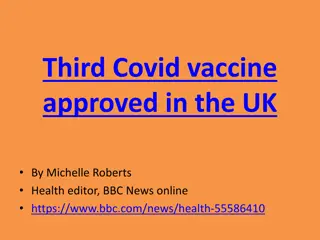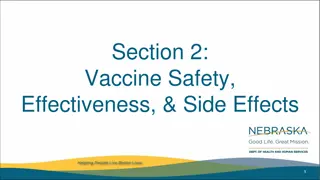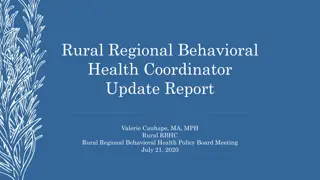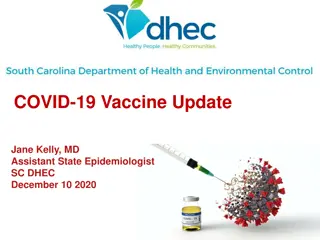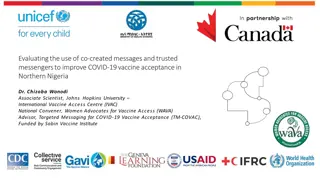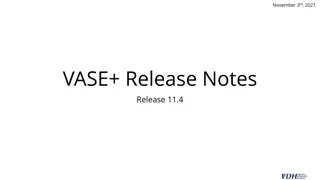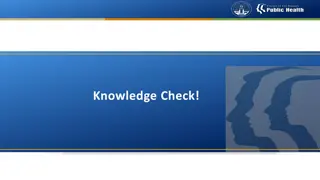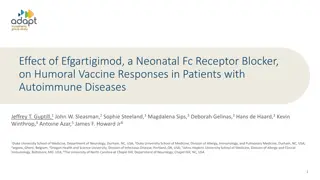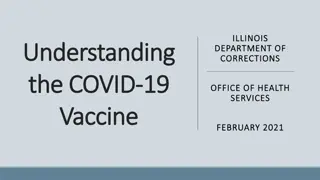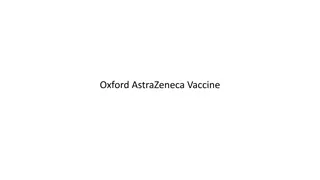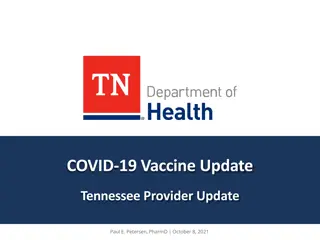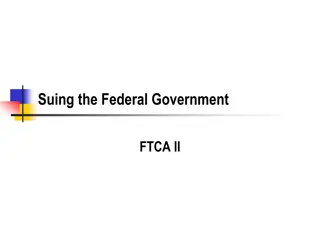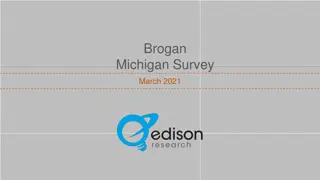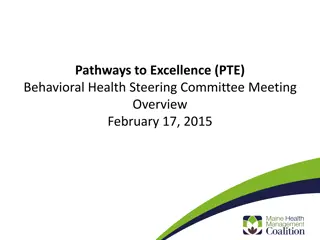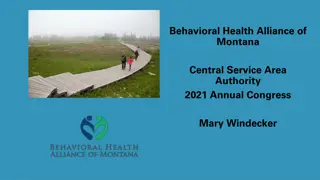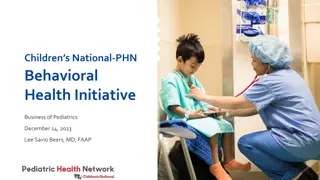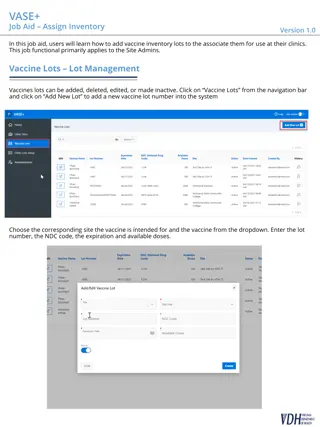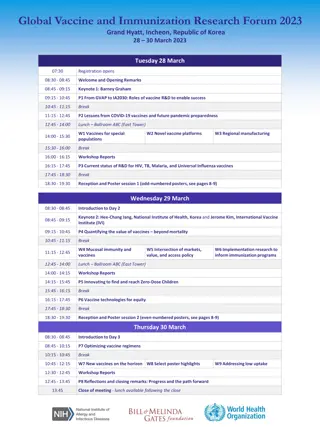March 31, 2021: Behavioral Health Updates & Vaccine Information
Senior Deputy Director Allen Jansen discusses behavioral health initiatives, COVID-19 vaccine updates, LTC pharmacy partnership program data, and overviews of skilled nursing facilities and other care facilities as of March 30, 2021.
Download Presentation

Please find below an Image/Link to download the presentation.
The content on the website is provided AS IS for your information and personal use only. It may not be sold, licensed, or shared on other websites without obtaining consent from the author.If you encounter any issues during the download, it is possible that the publisher has removed the file from their server.
You are allowed to download the files provided on this website for personal or commercial use, subject to the condition that they are used lawfully. All files are the property of their respective owners.
The content on the website is provided AS IS for your information and personal use only. It may not be sold, licensed, or shared on other websites without obtaining consent from the author.
E N D
Presentation Transcript
Welcome and Introductions Wednesday, March 31, 2021 Allen Jansen Senior Deputy Director Behavioral Health and Developmental Disabilities Putting people first, with the goal of helping all Michiganders lead healthier and more productive lives, no matter their stage in life.
Housekeeping We will not be granting permission for you to record today s presentation. Instead, we will record it and send the recording to these groups for distribution to their members: Community Mental Health Association of Michigan Michigan Assisted Living Association Michigan Center for Assisted Living Leading Age of Michigan If you re not a member and would like the recording, email us at MDHHS-COVID-AFC-HFA-Response@michigan.gov Please keep your microphones muted and type your questions into Chat.
Todays topics and guests COVID-19 Vaccine Updates Shelly Doebler, MPH Influenza Epidemiologist, Division of Immunization Quarantine and Isolation Brenda Brennan, MSPH, Manager, Surveillance for Healthcare-Associated and Resistant Pathogens (SHARP) Unit
COVID Vaccine Update Shelly Doebler, MPH Influenza Epidemiologist MDHHS Division of Immunization Putting people first, with the goal of helping all Michiganders lead healthier and more productive lives, no matter their stage in life.
LTC Pharmacy Partnership Program- Data Update
Overview Part A- Skilled Nursing Facilities 397 facilities enrolled 100% first clinics completed 100% second clinics completed 99% third clinics completed Part A Doses Administered 104,166 Total Doses Administered 57,877 First Doses 46,289 Second Doses Resident and Staff Doses 54,550 Resident Doses 49,616 Staff Doses Data as of 3.30.21 from CDC Tiberius Database
Overview Part B- Other facilities- ALF, HFA, HUD 202, AFC 3,413 facilities enrolled 98% complete- first clinics 89% complete- second clinics 36% complete- third clinics Total Doses Administered: 179,133 First doses: 95,109 Second doses: 84,024 Resident vs. Staff doses Doses administered to residents: 117,695 Doses administered to staff: 61,438 Data as of 3.30.21 from CDC Tiberius Database
Post-Federal LTC Program Vaccination Options
Vaccination Options for LTCF Partner with the local health department to receive vaccine for your facility Inquire about allocations available with traditional LTC pharmacy partners CDC has partnered with three pharmacies that traditionally serve LTC populations through the Federal Retail Pharmacy Program: Managed Health Care Associates (MHA) GeriMed Innovatix These partners will receive federal allocations and have been instructed by CDC to provide vaccine to LTCF residents and staff
Vaccination Options Continued Other Federal Retail Pharmacy Partners may be willing to work with LTC facilities to provide clinics Inquire with a retail partner in your area Current partners: CVS, Walgreens, Meijer, Kroger, Rite-Aid, Walmart, Spartan Nash (Topco), Cardinal (Snyder Pharmacies in the U.P.) Hospital partners may receive allocations of the single dose Johnson & Johnson vaccine. This can be utilized for patients being discharged from a hospital setting to a LTCF
Michigans Eligibility for COVID-19 Vaccination Visit www.Michigan.gov/COVIDvaccine -> Michigan s COVID-19 Prioritization Guidance Currently eligible: all adults aged 50 years and older, healthcare workers, long-term care residents and staff, frontline essential workers, individuals living in congregate settings, and individuals aged 16 years and older with disabilities and high-risk medical conditions Vaccine providers are prioritizing these individuals for vaccination
Michigans Eligibility for COVID-19 Vaccination (continued) Vaccine providers with the capacity to vaccinate all individuals aged 16 years and older may do so in accordance with the Michigan COVID-19 Prioritization Guidance The guidance states: by April 5, 2021, all areas of the state may, as vaccine supplies are available, implement vaccination of all people aged 16 and up who were not previously eligible.
Resources MDHHS Resources Long-Term Care Pharmacy Partnership Program: www.Michigan.gov/COVIDVaccine -> LTC Pharmacy Partnership page Updated FAQ and List of Participating LTC Facilities Questions: MDHHS-COVID-Longtermcare@Michigan.gov Michigan COVID-19 Vaccine Dashboard: https://www.michigan.gov/coronavirus/0,9753,7-406- 98178_103214-547150--,00.html Update daily M-F Data include doses distributed, doses administered, enrolled COVID-19 vaccine providers, and more
COVID-19 Quarantine Guidance for Residents Returning to the Facility Brenda Brennan, MSPH Surveillance for Healthcare-Associated and Resistant Pathogens (SHARP) Unit Manager
When a resident returns to the facility from ______, should they be placed in quarantine?
Quarantine Quarantine You had an exposure and may become ill Quarantine keeps someone who might have been exposed to the virus away from others Recommendations Stay home (HCP) or in observation area (residents) for 14 days after last contact with a person who has COVID-19 Watch for fever, cough, shortness of breath and other symptoms of COVID-19 for 14 days after exposure Stay away from others who are high-risk for COVID-19 If symptoms develop, immediately isolate and test for SARS-CoV-2
Ending Quarantine Recommendations For vaccinated individuals in healthcare settings Vaccinated inpatients and residents in healthcare settings should continue to quarantine following an exposure to someone with suspected or confirmed COVID-19; and cared for using appropriate Transmission-Based Precautions. This exception is due to the unknown vaccine effectiveness in this population, the higher risk of severe disease and death, and challenges with social distancing in healthcare settings Although not preferred, healthcare facilities could consider waiving quarantine for vaccinated patients and residents as a strategy to mitigate critical issues (e.g., lack of space, staff, or PPE to safely care for exposed patients or residents) when other options are unsuccessful or unavailable These decisions could be made in consultation with public health officials and infection control experts.
Leave-and-Return Decision Tool for Adult Foster Care (AFC) and Homes for the Aged (HFA) If no symptoms are detected or exposures reported, NO QUARANTINE is warranted. BEFORE LEAVING FACILITY Screen for symptoms. Educate on risk reduction: Wear mask Social distance Wash hands frequently SCREEN RESIDENT TO DETERMINE POTENTIAL EXPOSURE IF NO TO BOTH QUESTIONS Observe for 14 days from date of last visit to monitor for development of signs and symptoms. Staff must use general infection prevention and control methods. Make sure they are masked upon entry. Take their temperature. Ask these questions: 1. Have you experienced any of the following symptoms in the past 48 hours: fever or chills, cough, shortness of breath or difficulty breathing, fatigue, muscle or body aches, headache, new loss of taste or smell, sore throat, congestion or runny nose, nausea or vomiting, diarrhea? 2. Have you been in prolonged close contact* in the last 14 days with anyone who is known to have laboratory-confirmed COVID-19 OR anyone who has any symptoms consistent with COVID-19? If symptoms are detected or a known exposure reported, QUARANTINE IS RECOMMENDED. UPON RETURNING TO FACILITY (After prolonged absences or known exposures* in accordance with the Epidemic Order.) Resident should stay inside the facility for 14 days after last contact with a person who has COVID-19. Staff should monitor their health and make sure they stay at least 6 feet away from others. IF YES TO AT LEAST ONE QUESTION *Exposures include close contact: Being within 6 feet of an infected person for a cumulative total of 15 minutes or more over a 24- hour period. Watch for fever, cough, shortness of breath, and other COVID symptoms for 14 days after exposure. Screening guidelines If symptoms develop, immediately isolate the resident and test for COVID-19. NOTE: If a resident or staff person tests positive for COVID-19, follow the COVID-19 Emergency Response Tool. This guidance was corrected on 3-11-2021
How are we defining returning or leaving the facility? How do we know if someone should go into quarantine? CDC released new guidance to help determine quarantine status (March 29, 2021) Interim Infection Prevention and Control Recommendations to Prevent SARS-CoV-2 Spread in Nursing Homes Though intended for nursing homes, this also applies to other long-term care and residential settings https://www.cdc.gov/coronavirus/2019-ncov/hcp/long- term-care.html
Quarantine status depends on resident status, time and activity How to Determine Quarantine Status After Returning to the Facility Medical appointments, dialysis, hospital stay, family or community outing Leave is Less than 24 hours - with no known exposure or symptoms Known Exposure New Symptomatic Leave is More than 24 hours - with no known exposure or symptoms admissions No Quarantine1 Resident Vaccinated Quarantine No quarantine No quarantine quarantine a. Quarantine for hospital stay; b. For all others, assess risk of exposure3 (e.g., Activity, Time, Precautions Taken, Resources Available) Quarantine2 Resident Not Vaccinated Quarantine No quarantine Quarantine Resident COVID-recovered within 90 days No No quarantine4 Quarantine5 No quarantine No quarantine quarantine
My understanding is that MDHHS expects SNFs/AFCs My understanding is that MDHHS expects SNFs/AFCs to implement a 14 to implement a 14- -day quarantine for any resident day quarantine for any resident that leaves the facility for any reason. that leaves the facility for any reason. No that is not the expectation. The table outlines recommendations for quarantine based on resident status, time and activity away from the facility. It depends on vaccination or recovery status. Does patient status (COVID infection past 90 days or Does patient status (COVID infection past 90 days or vaccinated) remove this requirement? vaccinated) remove this requirement? Yes, for certain circumstances please see table. If the resident is accompanied and maintains other If the resident is accompanied and maintains other source control core principles of infection prevention source control core principles of infection prevention (wears a mask, social distance, hand hygiene) (wears a mask, social distance, hand hygiene) could they forego quarantine? they forego quarantine? could Yes, for certain circumstances please see table.
Quarantine status depends on resident status, time and activity How to Determine Quarantine Status After Returning to the Facility Medical appointments, dialysis, hospital stay, family or community outing Leave is Less than 24 hours - with no known exposure or symptoms Known Exposure New Symptomatic Leave is More than 24 hours - with no known exposure or symptoms admissions No Quarantine1 Resident Vaccinated Quarantine No quarantine No quarantine quarantine a. Quarantine for hospital stay; b. For all others, assess risk of exposure3 (e.g., Activity, Time, Precautions Taken, Resources Available) Quarantine2 Resident Not Vaccinated Quarantine No quarantine Quarantine Resident COVID-recovered within 90 days No No quarantine4 Quarantine5 No quarantine No quarantine quarantine
What are the guidelines for resident quarantine after a medical appointment? How to Determine Quarantine Status After Returning to the Facility Medical appointments, dialysis, hospital stay, family or community outing Leave is Less than 24 hours - with no known exposure or symptoms No quarantine a. Quarantine for hospital stay; b. For all others, assess risk of exposure3 (e.g., Activity, Time, Precautions Taken, Resources Available) Known Exposure New Symptomatic Leave is More than 24 hours - with no known exposure or symptoms admissions Quarantine1 Resident Vaccinated Quarantine No quarantine No quarantine Quarantine2 Resident Not Vaccinated Quarantine No quarantine Quarantine Resident COVID-recovered within 90 days No quarantine4 Quarantine5 No quarantine No quarantine No quarantine Per CMS: For medically necessary trips outside the facility: Wear a face mask or cloth face covering Facility shares the resident s COVID status with the transportation service
Does time away from the facility play a factor? Yes How to Determine Quarantine Status After Returning to the Facility Medical appointments, dialysis, hospital stay, family or community outing Leave is Less than 24 hours - with no known exposure or symptoms No quarantine a. Quarantine for hospital stay; b. For all others, assess risk of exposure3 (e.g., Activity/Time/Precautions Taken/Resources Available) Known Exposure New Symptomatic Leave is More than 24 hours - with no known exposure or symptoms No quarantine admissions Quarantine1 Resident Vaccinated Quarantine No quarantine Quarantine2 Resident Not Vaccinated Quarantine No quarantine Quarantine Resident COVID-recovered within 90 days No quarantine4 Quarantine5 No quarantine No quarantine No quarantine
Can any test (what type, when conducted) end quarantine or isolation early? No - you cannot test out of quarantine After an exposure, you could get sick within that time What about serologic testing? No The utility of serologic testing to provide evidence of prior infection that would permit exclusion from quarantine has not been established and is not recommended.
Guidance Coming Soon! MSA, MDHHS, BETP, and LARA are working on guidance for distribution soon Current recommendations are based off CDC s most recent update Interim Infection Prevention and Control Recommendations to Prevent SARS-CoV-2 Spread in Nursing Homes (March 29, 2021) https://www.cdc.gov/coronavirus/2019-ncov/hcp/long- term-care.html
Conclusion A recording of today s presentation will be sent to the groups below, and they will email it to their members. Community Mental Health Association of Michigan Michigan Assisted Living Association Michigan Center for Assisted Living Leading Age of Michigan If you re not a member and would like the recording, email us at MDHHS-COVID-AFC-HFA-Response@michigan.gov
Send your questions/comments to: Staffing: MDHHS-LTCStaffing@michigan.gov Vaccines: MDHHS-COVID-Longtermcare@Michigan.gov Testing: MDHHS-Binaxnowrequest@michigan.gov Emergency Orders: MDHHS-MSA-COVID19@michigan.gov All Other Questions: MDHHS-COVID-AFC-HFA-Response@michigan.gov Subscribe to correspondence at this link: Subscribe
